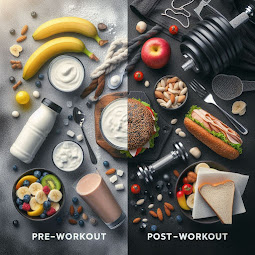Nutrition and fitness are two vital pillars that work hand-in-hand to enhance overall health and well-being. When properly aligned, they can fuel your body, elevate your performance, and speed up recovery. This blog is a comprehensive guide designed to offer valuable insights into integrating nutrition and fitness seamlessly into your lifestyle.
The Foundation of Nutrition
Nutrition is all about fueling your body with the essential nutrients it needs to function effectively. Understanding the different types of nutrients can help you craft a diet that supports your fitness goals.
Macronutrients: The Building Blocks
1. Carbohydrates: The primary energy source. Opt for complex
carbohydrates like whole
grains, legumes, and vegetables to ensure sustained
energy for your workouts.
3. Fats: Healthy fats, including avocados, nuts, and olive oil, are essential for hormonal balance and nutrient absorption.
Micronutrients: Essential Elements
Vitamins and minerals play a key role in supporting various physiological functions, including immune health and energy metabolism. A diet rich in fruits and vegetables ensures you're getting enough of these crucial micronutrients.
The Role of Hydration in Fitness
Water is often overlooked but is fundamental to physical performance. Adequate hydration boosts endurance, strength, and recovery. Aim for at least eight 8-ounce glasses of water daily, adjusting based on your activity level and the climate.
Fitness: Moving Toward Your Goals
Fitness is more than just the absence of disease; it's a holistic approach that includes physical activity, mental well-being, and social connectivity. A well-rounded fitness routine should incorporate cardiovascular exercise, strength training, flexibility, and balance.
Types of Exercise
1. Aerobic Exercise: Activities like running, cycling, and swimming that improve cardiovascular health and endurance.
2. Strength Training: Using weights or resistance bands to build muscle mass, boost metabolism, and enhance bone density.
3. Flexibility Training: Practices such as yoga and stretching to promote flexibility, balance, and overall mobility.
Nutrition Timing for Enhanced Performance
When you eat can be just as important as what you eat.
Proper nutrition timing can significantly improve your energy levels and
recovery.
Consume easily digestible carbohydrates and moderate protein 30 to 60 minutes before exercising. A banana with peanut butter or a small yogurt makes a great pre-workout snack.
Post-Workout Recovery
After exercise, a meal rich in protein and carbohydrates
within 30 minutes aids muscle recovery. A protein shake with fruits or a lean
turkey sandwich are excellent post-workout options.
Creating a Sustainable Nutrition and Fitness Routine
Building a sustainable routine is key to long-term success. It requires realistic goal-setting, consistency, and gradual changes.
- Set Specific, Measurable Goals: Align your goals with both
nutrition and fitness objectives.
- Keep a Food and Exercise Diary: Track your progress and
identify areas for improvement.
- Prioritize Variety: Incorporate a wide range of food choices to prevent monotony and ensure a broad nutrient intake.
Visualizing the Nutrition-Fitness Connection
Understanding the relationship between nutrition and fitness
is crucial for achieving your goals. Here's a simple breakdown:
Integrating nutrition and fitness into your daily life is essential for achieving optimal health and well-being. By understanding the key components of nutrition, the importance of hydration, and the variety of exercise types, you can create a balanced lifestyle that supports your fitness ambitions. Stay committed to these principles, and you'll find greater success in both your nutrition and fitness endeavors.


